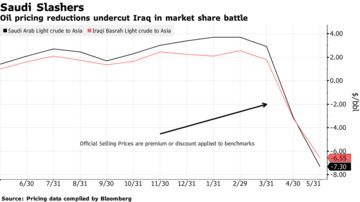The uneasy truce that settled over oil markets this month as some of the world’s largest producers began cutting output belies the raging competition among exporters seeking to preserve their share of a diminished market.
Saudi Arabia, the world’s biggest exporter, appears to be winning the fight for sales as it slashes prices for its crude. Producers globally are struggling to retain customers as the coronavirus destroys demand for fuel. After flooding the market in April, producers are now scaling back shipments as part of the deal by OPEC+ suppliers to soak up the glut in oil.
For evidence of where the Saudis have been winning, look no further than last month’s crude exports. Saudi Arabia was the only one of OPEC’s top four producers to boost sales to India in April, according to Bloomberg tanker tracking. The kingdom’s shipments to China doubled, and its exports to the U.S. reached 1 million barrels a day, the most since August 2018.
“The Saudis are doing very well,” said Ahmed Mehdi, a research associate at the Oxford Institute for Energy Studies, referring to the battle for buyers. “Aramco has been aggressive in protecting market share in Asia.”

State oil producer Saudi Aramco slashed its official selling prices for April crude sales to some of the lowest levels in decades, undercutting rivals. For cargoes loading for Asia in May, Aramco cut pricing even further, and it’s expected to widen discounts to that region for June.
That helped Aramco to place its crude even amid a surge in supply. Saudi exports to China more than doubled in April to 2.2 million barrels a day, the highest level since Bloomberg began tracking flows at the beginning of 2017. Shipments to India, at 1.1 million barrels a day, were also the highest in at least three years.
The case of India highlights Saudi gains. Iraq, the second-biggest member in the Organization of Petroleum Exporting Countries, edged the Saudis for the top spot in oil sales to the South Asian country for most of the last three years.
State oil producer Saudi Aramco slashed its official selling prices for April crude sales to some of the lowest levels in decades, undercutting rivals. For cargoes loading for Asia in May, Aramco cut pricing even further, and it’s expected to widen discounts to that region for June.
That helped Aramco to place its crude even amid a surge in supply. Saudi exports to China more than doubled in April to 2.2 million barrels a day, the highest level since Bloomberg began tracking flows at the beginning of 2017. Shipments to India, at 1.1 million barrels a day, were also the highest in at least three years.
The case of India highlights Saudi gains. Iraq, the second-biggest member in the Organization of Petroleum Exporting Countries, edged the Saudis for the top spot in oil sales to the South Asian country for most of the last three years.
Last month, however, Iraq’s exports to India plummeted to the lowest since June 2018 as the South Asian country shut down much of its economy to counter the coronavirus and refiners there reduced operating runs and rerouted cargoes. The increase in Saudi exports to India in April almost exactly offset the decline in Iraqi sales.

Like other producers, Saudi Arabia must contend with a plunge in demand due to coronavirus lockdowns. Brent crude has lost about half its value this year, and the benchmark closed above $30 a barrel on Tuesday for just the first time in three weeks.
Saudi Aramco made deeper pricing cuts than Iraq for its key grade for sale to Asia for both April and May. Barrels of Saudi Arab Light crude are even selling at a rare discount to Iraqi barrels for May.

Saudi exports to the U.S. surged to an average of 1 million barrels daily, the most since August 2018. Aramco generally exports to America from the Persian Gulf, but April’s flows included the first observed cargo from one of the kingdom’s Red Sea ports to the U.S. West Coast in at least three years. A second shipment embarked on the same route in early May.
Figures for the amount of oil loaded for a specific location may rise because some tankers have yet to indicate their final destinations.
The Saudis aim to defend sales from competing crude from the U.S., Russia and Africa, said Gavin Thompson, vice chairman for energy in the Asia Pacific region at consultant Wood Mackenzie Ltd. Aramco’s pricing cuts for May “gave clear notice of its strategic goal to ensure that its crude remains highly competitive in Asia,” he said in a note.





